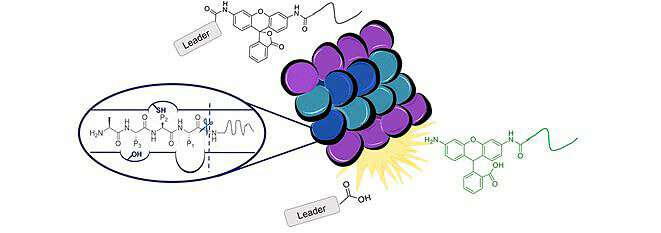Probe shines light on overactive immune cells to help detect, treat certain cancers, autoimmune diseases

One frustration for doctors and patients dealing with certain cancers and autoimmune diseases is that they know the cause, but they don't know how to reduce its effects in the body.
A clue can be found with the immunoproteasome, a protein complex in the body that is present in specific types of cancers, such as colorectal, colon and breast. It also is present in autoimmune diseases where cells have encountered a pro-inflammatory signal where the body's immune cells start to attack and destroy themselves. Identifying and reducing this autoimmune response is an ongoing challenge for medical professionals.
"It is well understood which types of cells will express the immunoproteasome," said Darci Trader, an assistant professor of medicinal chemistry and molecular pharmacology in Purdue's College of Pharmacy, who leads the research team. "How its activity can be perturbed to affect disease is not."
Trader and her Purdue University team have designed a new probe to monitor and label immunoproteasome-expressing cells.
Current probes are inefficient for monitoring the activity of the immunoproteasome in live cells because they are not very cell permeable and can easily be degraded by other cellular proteases. The work is published in the March 20 edition of the Journal of the American Chemical Society.
"Having an immunoproteasome-selective probe that can work in live cells allows for a quicker readout of how small molecules are affecting the activity of the immunoproteasome," Trader said. "We are going to use our new immunoproteasome probe to discover small molecules to help tweak the immune system response for people dealing with cancers, infections and autoimmune diseases."
In the case of cancer or infections, the aim is a quicker immune system response. In the case of autoimmune diseases, the goal is to lessen the immune systems response. As the probe fluoresces to indicate immunoproteasome is present, the identification of small molecules could lead to increasing or decreasing the immune system response to best serve the patient.
Trader said they also are working to test the ability of the probe to detect the immunoproteasome and then use it as a vehicle to release drugs to treat cancer and other diseases. They are specifically looking at the use of prodrugs, which are biologically inactive compounds that selectively produce medication effects based on how they are created.
More information: Breanna L. Zerfas et al. Monitoring the Immunoproteasome in Live Cells Using an Activity-Based Peptide–Peptoid Hybrid Probe, Journal of the American Chemical Society (2019). DOI: 10.1021/jacs.8b12873
Journal information: Journal of the American Chemical Society
Provided by Purdue University


















